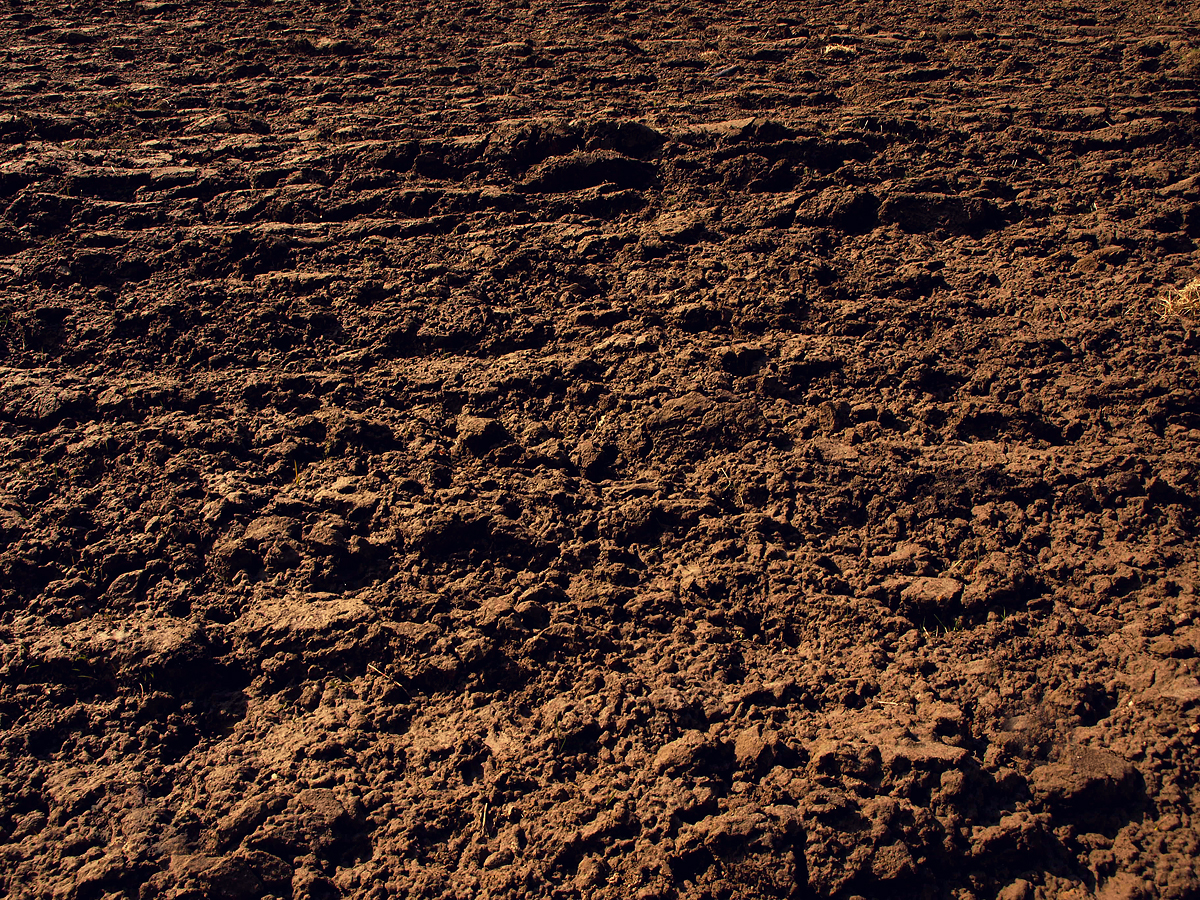Amending your soil properly can overcome heavy, compacted clay and get it back on track for healthy lawn and garden growth. Adding materials such as organic compost, pine bark, composted leaves and gypsum to heavy clay can improve its structure and help eliminate drainage and compaction problems. Heavy or hard soils contain a high percentage of clay and low amounts of silt and sand, resulting in compacted soil that becomes difficult to till. This proves especially true when the clay soils become devoid of organic material, which lightens soil texture by preventing all of the clay particles from sticking together. Improving a clay soil lawn or garden by adding decomposed organic material, such as compost, not only improves workability but increases fertility.
Cover crops, also called green manure crops, help loosen clay or compacted soils with their roots and by adding organic matter. They also prevent nutrient loss and erosion during the non-growing season. Leguminous cover crops, such as winter rye, alfalfa, hairy vetch and clover, which add nitrogen to the soil, are usually planted at the end of summer or early fall. When I first start a garden and double dig my rows (3' wide minimum) I will add DECOMPOSED organic matter and fertilizer and mix sorta kinda. Without using anything else this makes raised beds.
Sometimes there is a lot of moisture in the soil but it will look dry to you. My beds for plants are always ALWAYS raised with trenches at the bottom of the slopes to take excess water away to where ever I dictate. No matter what kind of soil I have, I make these raised beds. They start out a couple of feet high with the fluffy soil and then they are formed and compacted to get rid of large air pockets.
While wet earth by itself isn't easy to dig, one can use how moisture affects the dirt to their advantage. Damp earth can clump up, become heavier, and stick to the blades of your shovel. However, clay soils hard on the surface can break up after digging 10 inches into the ground. This wetting process underneath the top layer of earth allows you to lift entire earth pillars with a post hole digger easily. Gypsum is easily applied to the soil surface with a regular lawn spreader. It's an ideal amendment for improving soil structure and relieving compaction in existing lawns and gardens.
When using this method, adding a layer of an inch or two of sand or gravel on top of the clay will allow plants that cannot normally grow in clay to thrive. This is because some or most of their root system is above the clay soil, but the tips of the roots can still pull nutrients and water out of the clay. Common soil amendments include compost, grass clippings, straw, shredded leaves, rotted manure and dried seaweed.
Compaction is most likely to occur with heavier soils like clay and loam, but when heavy equipment is used, sandy soils can become compacted. These are soil particles that are packed closely together. The problem may be compounded by events that have happened to the soil over the course of years. The pore spaces are reduced to the point that air and water cannot move freely and plant roots cannot grow easily into the surrounding soil.
The soil could remain overly wet longer than is healthy for the plants growing there. Avoid adding sand or peat moss to clay; they can make those problems worse. In a garden bed, the best way to introduce organic material without digging , is to apply layers on top and let nature do the work for you. Simply pile your garden bed high with organic material – it can be wood chips, shredded paper, straw, chopped leaves, lawn clippings – whatever you can lay your hands on. It might be slow, but the wait will give you time to get to know your land before you plant. Instead of gypsum, consider core aerifying in spring, summer or early fall to reduce the compaction and improve plant health.
Aerifying with large half-inch hollow tines and punching about 25 holes/square foot will produce good results. Very compacted soil can benefit from several corings each year . This does not minimize the benefit of have a high Ca and Mg level reading in your soil test, but coring does physically reverse a physical compaction of soil particles. Yes, coring is an expensive service to buy, and most lawns really don't need it; but it won't hurt. And if the soil is compacted, it's usually the best solution to the stifled growth.
Walking on your lawn or garden when its wet is a common cause. Heavy, beating rains also drive clay particles together. Salts from fertilizers and winter de-icing solutions build up in heavy clay as well. Once you have realized your soil is compacted, there are several things to be done. Resist the urge to routinely roto-till or cultivate the garden. Instead, consider adding organic matter by using mulch or compost over the top of a flower bed or simply hand-spade it into the top 3 to 6 inches of soil.
For a vegetable garden, put 2 inches of compost on the soil surface and till in and repeat for a total of 4 inches in a season. A goal of 5 to 15 percent of organic matter would be advantageous. You will need to work at it over the years by repeating the process though.
Baked clay is almost impossible to break up, rotivate or dig, it's easier to spread the organic matter and grit and wait until the worms have done some of the work for you. To soften the hard soil, start by breaking up the top few inches as much as possible. Once you have raw broken soil, add a layer of compost, mixing it in with the broken up hard soil. Adding small amounts of water can also help to soften the soil, making it easier to dig and install a different landscape edging option. Your soil test or extension agent can help you determine the right amount of organic matter for your soil. In following years, build on your efforts by adding 1 to 3 inches of organic mulch as a topdressing each year.1 As it decomposes, it continues to gradually improve clay soil.
Adding sand can be tricky and typically is not recommended to be added to clay soil. A slightly faster option is to cover the soil with material that is full of soil microbes, as these will speed up the process. This includes compost, worm castings, and manure – and less of the dense, harder materials such as wood chips, which take longer to decompose. Make sure to cover this 'active' compost etc with a layer of straw mulch to avoid it drying out as this will kill the useful microbes, which don't like hot sun. Deep watering once a week will also keep things moving. After about a month you'll notice a difference and, if you keep feeding your soil every spring and autumn, it will soon be full of life and all your plants will thrive.
The addition of lime can raise the soil pH to excessively high levels, reducing the availability of plant nutrients and leading to poor plant growth. Advertisements for gypsum often claim the addition of gypsum will help loosen heavy, clay soils and improve soil drainage. Clay's potential as one of the best soil types for plant growth lies in its unique properties. Managed well, clay soil typically requires less irrigation and less fertilizer, and leads to healthier plants all around. Most heavy clay soils benefit from the addition of gypsum. It adds some nutrients but, more importantly, it loosens clay soils and makes it more workable.
Spread about 3 to 4 pounds of gypsum per 100 square feet over garden soil after it has been dug in the winter. Work it into the soil or allow it to be washed in by rain. Do not add sand to clay soils, as the small particles in clay bind with the sand creating dense soil that compacts easily. The weight of your footsteps can easily compact wet soil. Aeration should be part of every homeowner's lawn maintenance plan, but it is particularly important for residents of DFW. Aerating twice a year will keep the easily compacted clay soils of DFW loose and porous for optimal plant growth.
Ideally, DFW lawns should be aerated once in the spring and a second time in the fall. Commercial products, such as ClayMend, are also available to amend clay soil by introducing beneficial soil microbes and supplying them with nutrients. The company states that a blend of organic acids gathers ultra-fine clay particles and then microbes work to secure them together. This process opens the soil, allowing it to breathe. The beneficial microbial activity increases and plant roots are able to establish themselves in the restructured soil.
Nutrients that have been locked away become free to be attached to the organic material and the clay structures for easy access by the plant roots. Routinely scattering organic matter over the soil surface is the best long-term fix for clay or soil compaction. Without any further help, soil organisms will incorporate the organic matter and begin to loosen the soil.
Whatever hasn't rotted down by then is put on the compost pile. Worms will have carried their castings up through the soil beneath the trash and it will be fine, clear tilth. For a large vegetable garden, another solution is to grow a cover crop at the end of the season, then mow and turn in the following spring before planting.
The roots penetrate the compacted soil and loosen it. By mowing and turning the mowed tops in, the soil is additionally loosened. Cover crops could include annual ryegrass, winter wheat, winter rye, buckwheat, oilseed radishes and hairy vetch. About half of a healthy soil is made up of mineral particles like sand, silt and clay plus organic matter. That is the room for air and water movement around the mineral particles. Pore space is required in order to have a healthy environment for plant roots and beneficial microorganisms and earthworms to break down plant residue into organic matter.
And that is the last time I will mess with the soil of my beds expending lots of calories on my part. Also, by dumping a couple of inches on top of your beds, whether veggie garden or landscape ornamental beds, is the best way to get rid of weeds. I can't stand to take extra steps, do things that are unnecessary. A quick test is to push a steel rod or long screwdriver into moist soil – if you can't push it very far you may have compacted soil. To confirm, dig a 30cm-deep hole and slice a layer off the side for a closer look. Looser soil separates easily, while compacted soil is smoother and more solid – and often has visible horizontal layers.
You might even see plant roots growing horizontally along the lines, unable to break through. Clay's small particles make it hard to dig through, but they also allow it to hold water much better than sand or silt. So if you want to soften your clay soil for digging post holes, give it a thorough, deep watering. Walking on your lawn once it has been tilled and yet to dry will often result in compacted soil or hard soil. Even though most soils will harden under heavyweight, soil rich in clay is more prone to hardening because of clay soil's low drainage and tiny soil particles.
By taking steps to improve and maintain your heavy clay soil, you can enjoy all the benefits clay offers and reap the rewards of healthy soil and plants. Penningtonis here to help you overcome lawn and garden challenges and grow the best lawn and garden possible, in heavy clay and every other soil type. If you're planning to put in a much longer fence line, soften the soil by digging pilot holes 6 to 10 inches deep then fill each with water from a garden hose. Allow the water to percolate down through the soil before attempting to dig out the hole using a post hole digging shovel, also called a clamshell shovel. Garden centers and lawncare services often advise applying gypsum to your lawn to "decompact" a hard soil. This is supposed to accomplish softening by improving the structure of the compacted clay soil.
With the exception of the arid western United States and our coastal areas , adding gypsum as a soil-softening amendment is not necessary in nonagricultural areas. To keep soil softened, add organic material such as compost or animal manure into the soil each spring before planting time. Apply organic mulch, like hay, around plants and allow it to decompose and work its way down into the soil. The organic material will ensure the soil is softened year round.
How To Soften The Ground For Digging Not only is this difficult if not nearly impossible to dig in, it can create a host of other problems for growing plants in your garden. Ideally, water will absorb through your soil to a depth of about 6 inches. This doesn't happen in hardened soils, water will take the path of least resistance and you'll end up with run off, puddles, and a water depth of only a couple of inches. On ce you have completed the above mix in sand and compost. In the fall put all your leaves on the garden area wet down good and cover with plastic for the winter. If you have as much clay as it sounds u are not going to be very successful until u amend that ground, two inches of lose soil isn't going to allow roots to develop.
Gas-powered augers can make deck footings or fence-post holes fast and easy, but only in some types of soil. In rocky soil, you'll have to stop occasionally to pull out rocks with a clamshell digger. Because of these frustrations, some deck and fence contractors don't bother with power augers and simply hand-dig every hole. Adding sand creates the opposite of the desired effect.
Add organic matter such as compost, peat moss or leaf mold when loosening the soil. If you'd like to quickly break up a hard soil surface for planting, mix the organic matter into the top 3 to 6 inches of soil with a spade. Clay also has moisture retention properties which can be useful during long dry spells.
Earthworms are another way to improve soil compaction. When your soil is compacted, your plants can't grow well. It's something that many gardeners are simply not aware of. Knowing how soil compaction happens and then taking steps towards improving compacted soil will help your garden flourish. A somewhat less quick and easy method is to convert existing clay soil to a non-clay form of soil.
If your growing area is on a slope or hill, the slope may allow water to escape without digging drain paths. Ideally soil has air pockets to allow moisture, worms, roots and microbes to pass through. When soil gets compacted these air pockets get squeezed out and it's harder for plants to grow and for water to reach plants' roots. Water will pool on the surface instead and the plant can literally suffocate.
Cover areas of clay soil with slower composting materials such as bark, sawdust, or ground wood chips. Use these organic materials for mulch, and, as they break down, they will work themselves into the soil below. However, digging post holes can be easier if you manage to get clay soil just below the surface to collect enough water to loosen up. That means you need to be wetting and waiting until the earth below the surface is loose enough to lift.
If the ground does not have enough air space, water and nutrients will not circulate properly, making it difficult for your grass to grow. Luckily there is something you can do to soften and prevent soil hardening. Reseed the affected area, if you're improving a clay soil lawn. If you're amending soil for a vegetable or flower garden, you can begin planting immediately once you've added the amendments. If you don't plan to plant immediately you should cover the area with a heavy layer of mulch to prevent erosion and slow water absorption. Otherwise your hard work might literally be washed away by a heavy rain or two.
Spread 1 pound of gypsum over every 5 square feet of soil. Using gypsum for clay soil will bind the organic matter to the soil particles and prevent the soil from crusting over or cracking once dry. While gypsum adds calcium to the soil, like lime, it doesn't affect your soil's pH as lime does. Till the gypsum into the top 8 inches of soil with the rototiller, then rake the soil surface smooth. Spread a 2-inch deep layer of compost over the soil with a shovel.


























No comments:
Post a Comment
Note: Only a member of this blog may post a comment.